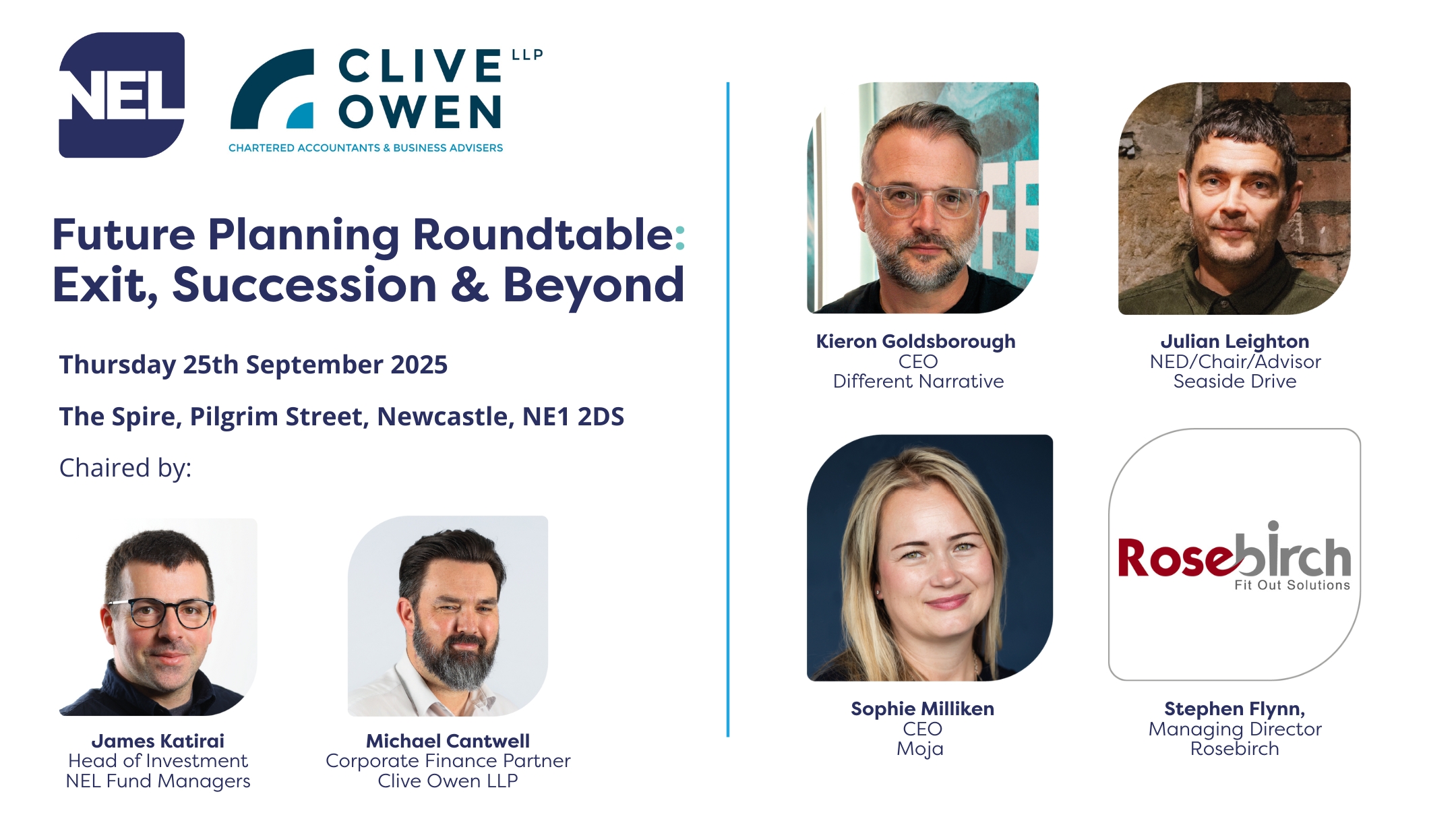Planning for the future – and talking about it
Clive Owen LLP and NEL Fund Managers hosted an exclusive roundtable bringing together entrepreneurs from across the region to share honest reflections on exit strategies, succession planning and long-term growth. The key takeaway? Start early, know your options, and never underestimate the value of people and culture in shaping a successful exit.
Chaired by Michael Cantwell (Corporate Finance Partner, Clive Owen LLP) and James Katirai (Head of Investment, NEL Fund Managers), the session explored everything from management buyouts (MBOs) to trade sales whilst preparing a business – and its people – for transition.
Participants included:
- Sophie Milliken, CEO, Moja
- Stephen Flynn, Managing Director, Rosebirch
- Kieron Goldsborough, CEO, Different Narrative
- Julian Leighton, NED/Chair/Advisor, Seaside Drive
Opening the discussion, Michael Cantwell challenged the long-standing taboo around discussing personal wealth and exit strategy among the region’s entrepreneurs.
“There’s still a taboo around discussing personal wealth and exit strategy in the North East,” he said. “But the earlier you start planning, the more value you can build into your business – and the smoother the exit will be.”
From early exits to new beginnings
Several founders shared their personal journeys. Julian Leighton, who sold his digital agency after growing it from two to 150 people, revealed he had built his business with an exit in mind.
“From day one, we set up to sell,” he said. “But we tried too early and got told we weren’t ready. Bringing in non-execs changed everything – they helped us grow strategically and prepare properly.”
Reflecting on his sale, Julian admitted: “In hindsight, I wish we’d explored a management buyout. At the time, trade sales were the default. I also wish we’d looked at minority sales – those options just weren’t on our radar.”
Culture, continuity and the people factor
For Kieron Goldsborough, CEO of Different Narrative, the cultural impact of an exit can be just as important as the financials.
“A trade sale and an MBO are completely different culturally,” he said. “For us, an MBO feels more aligned with our values – it keeps the business in the hands of people who care about it.”
That theme of continuity resonated throughout the discussion. “If you build a culture and leadership team that can stand on its own,” any transition becomes much easier” Kieron added.
Lessons from experience
Sophie Milliken MBE, Founder and CEO of Moja Group, spoke candidly about her first experience of exiting a business.
“I was flattered to be approached but completely naive,” she said. “I hadn’t set up the business to sell and didn’t understand the process – it was awful.”
This time around, her approach is more deliberate: “I’ve built Moja with an exit in mind, but I’m not rushing it. I’ve learned there are many more options now – from MBOs to employee ownership – and understanding them makes a huge difference.”
Stephen Flynn, Managing Director of Rosebirch, is also focusing on preparation. “I’m trying to build a business that has value – one that can run without me,” he said. “That means investing in people, leadership and financial discipline. It’s expensive, but essential.”
Structuring for success
NEL has worked with numerous shareholders looking to exit their business and Head of Investment James Katirai emphasised that strong governance and financial structure directly impact a company’s value.
“In smaller firms, the owner and business are often one and the same,” he explained. “If you’re serious about growth and a potential exit, you need a structure around you – finance functions, non-execs, fractional FDs, etc.”
He also dispelled myths about MBOs and what they need to look like: “There’s this outdated view that management teams need lots of personal cash. That’s no longer true – deals today are much more flexible.”
Facing the numbers and the reality
Valuation expectations were another recurring theme. “It’s fine to say, ‘I want £5 million to retire,” said Julian, “but if your business is worth three, you’ve got to plan how to get there.”
James Katirai added: “Be realistic. Know what your business is worth today and understand the steps to bridge the gap.”
Shared takeaways
By the end of the discussion, several key messages had emerged, including:
- Start early – exit planning works best when built into long-term strategy.
- Invest in people – strong leadership and culture drive value.
- Understand your options – trade sale, MBO, or minority sale all have different implications.
- Be financially prepared – good governance and cashflow discipline are non-negotiable.
- Stay realistic – valuation must align with market reality, not wishful thinking.
In closing, Michael summarised the overarching lesson from the day.
“The key lesson is awareness – knowing your exit routes, timing, and starting early,” he advised. “Even if you ultimately choose a trade sale, at least you’ve considered every option.”
Did you know that NEL’s funds can be used for a range of business growth purposes including MBOs, MBIs & Acquisitions? Read more about the funds here.
Additionally, whether you’re exploring a sale, management buyout or succession plan, Clive Owen LLP’s Corporate Finance team is available to guide you every step of the way.

